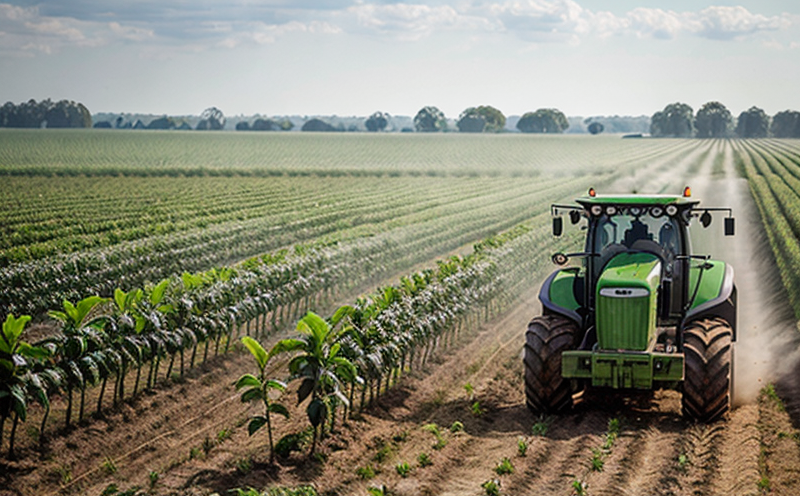ISO 15913 Greenhouse Gas Emission Testing in Agriculture
The ISO 15913 standard provides a robust framework for quantifying and assessing the greenhouse gas (GHG) emissions from agricultural activities. This service ensures that agricultural operations comply with global best practices, thereby promoting sustainability and reducing environmental impact.
Greenhouse gases such as carbon dioxide (CO2), methane (CH4), and nitrous oxide (N2O) are critical to monitor in agriculture due to their role in climate change. By implementing ISO 15913 testing protocols, agricultural entities can effectively manage emissions and contribute positively to environmental sustainability.
The testing process begins with the identification of potential sources of GHG emissions within an agricultural operation. This includes soil management practices, fertilizer application, livestock operations, and energy use. Once identified, these sources are quantified using standardized methodologies defined in ISO 15913.
Specimen preparation is a critical step in ensuring accurate results. Soil samples must be collected at specific depths to capture the profile of emissions from different layers. For livestock operations, gas samples are taken directly from manure and feed storage areas. The collected specimens undergo rigorous analysis using advanced instrumentation such as gas chromatographs and infrared spectrometers.
After specimen preparation, the testing process involves several key steps:
- Gas Collection: Gas samples are collected under controlled conditions to minimize external interference.
- Cleaning and Purification: The collected gas is cleaned of impurities using specialized filtration techniques.
- Analytical Measurement: Gas concentrations are measured using precise analytical instruments. These instruments provide accurate data on CO2, CH4, and N2O levels.
- Data Interpretation: The raw data from the measurements is interpreted to determine compliance with established emission limits.
The final step in the process involves reporting the results according to ISO 15913 guidelines. This report includes detailed information on the sources of emissions, measured gas concentrations, and comparisons against baseline data. Compliance with standards such as ISO 15913 not only ensures operational efficiency but also provides a competitive edge by demonstrating commitment to environmental responsibility.
By adhering to these testing protocols, agricultural operations can:
- Ensure compliance with international standards.
- Identify areas for improvement in emissions management.
- Implement targeted mitigation strategies to reduce GHG emissions.
- Report accurate and reliable data for regulatory and reporting purposes.
The ISO 15913 standard is widely recognized as a gold standard in agricultural greenhouse gas emission testing. Its implementation ensures that agricultural practices are not only sustainable but also contribute positively to global environmental goals.
Applied Standards
| Standard | Description |
|---|---|
| ISO 15913-1:2014 | Guidelines for the quantification of greenhouse gas emissions from agricultural soils. |
| ISO 15913-2:2018 | Methods for measuring methane and nitrous oxide emissions from animal manure management systems. |
| ISO 15913-3:2020 | Guidelines for the quantification of greenhouse gas emissions from crop production systems. |
| ISO 15913-4:2021 | Methods for measuring greenhouse gas emissions from livestock operations. |
The application of these standards ensures that testing is conducted in a standardized and internationally recognized manner. This approach enhances the credibility and reliability of the test results, making them valuable not only within the agricultural sector but also for broader environmental assessments.
Quality and Reliability Assurance
The quality and reliability of ISO 15913 testing are paramount. Our laboratory adheres to strict quality management systems, ensuring that every test is conducted with precision and accuracy. We employ highly skilled technicians who are trained in the latest methodologies and technologies.
Our commitment to quality extends beyond mere compliance; it includes continuous improvement and innovation. We regularly update our instrumentation and techniques to stay at the forefront of agricultural GHG testing. This ensures that we provide clients with the most accurate and reliable data available.
We also invest in robust calibration and validation processes, ensuring that all instruments are operating within specified tolerances. This approach minimizes errors and enhances the overall precision of our test results.
Our quality assurance measures include:
- Calibration: Instruments are calibrated regularly to ensure accuracy.
- Validation: Test methods are validated against known standards to confirm reliability.
- Data Verification: Results are cross-verified with multiple data points for consistency.
- Auditing: Internal and external audits are conducted regularly to maintain compliance with international standards.
Our clients can rest assured that they receive the highest quality testing services, backed by a commitment to excellence. The accuracy of our results is crucial in making informed decisions about emissions management strategies.
Environmental and Sustainability Contributions
The significance of ISO 15913 testing extends far beyond compliance; it plays a critical role in promoting environmental sustainability. By accurately quantifying GHG emissions, agricultural operations can identify areas for improvement and implement targeted strategies to reduce their environmental footprint.
This service supports the broader goal of sustainable agriculture by:
- Encouraging the use of low-emission farming practices.
- Facilitating the development of more efficient energy systems.
- Promoting the adoption of climate-smart agricultural techniques.
- Enhancing public trust through transparent reporting of environmental performance.
The insights gained from ISO 15913 testing enable stakeholders to make informed decisions that align with global sustainability goals. By reducing GHG emissions, agricultural operations contribute positively to the fight against climate change and promote a healthier environment for all.





